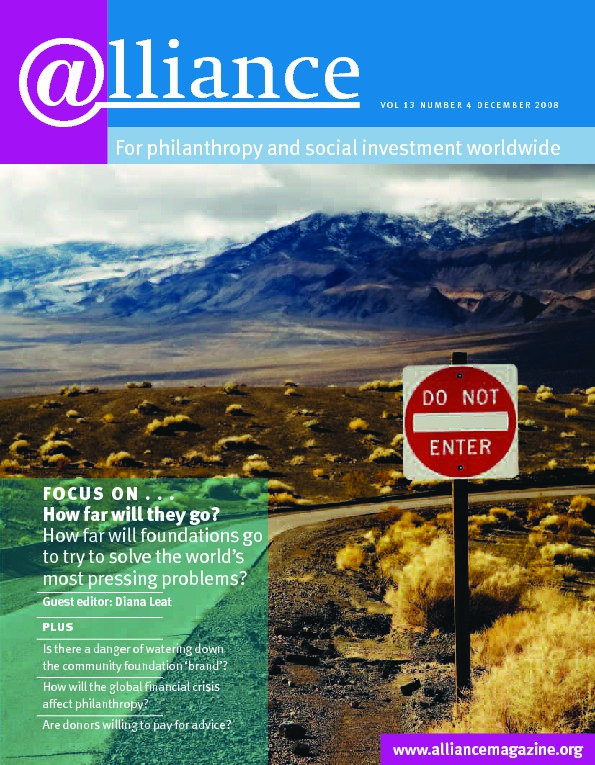 This issue of Alliance raises the question why foundations are so often failing to respond to emerging global crises. Many foundations would argue that their greatest value lies in their long-term view and that their role is to address ongoing social inequalities over time. So the question is not about foundations dropping everything they do in light of global crises such as the HIV/AIDS pandemic or climate change but about making sure that their work reflects new and emerging global realities. And this is a question of effectiveness.
This issue of Alliance raises the question why foundations are so often failing to respond to emerging global crises. Many foundations would argue that their greatest value lies in their long-term view and that their role is to address ongoing social inequalities over time. So the question is not about foundations dropping everything they do in light of global crises such as the HIV/AIDS pandemic or climate change but about making sure that their work reflects new and emerging global realities. And this is a question of effectiveness.
Only by sticking with an issue or vulnerable group for the long term through fashion and fads can sustainable impact be made. But if this long-term work is not combined with a responsiveness to new realities, it will not be effective.
For example, foundations working in Africa had to change their programme strategies when faced with the impact of the HIV/AIDS pandemic. In South Africa, teachers were dying more quickly than they could be trained (this was before the availability of ART). In the face of this, the Rockefeller Brothers Fund funded an accelerated teacher-training programme – it simply couldn’t be business as usual.
However, foundations could be charged with not holding themselves to account about the impact and effectiveness of their interventions and not being opportunistic enough to take advantage of, and respond rapidly to, the fast-changing world in which we live. We have to remember that all of foundations’ global spend added together is dwarfed by bilateral aid and even more so by trade flows. Our work therefore has to be strategic, collaborative, and far better contextualized for us to fully exploit our independent niche.
Foundations must be willing to take risks – and some are. The Diana Princess of Wales Memorial Fund has always championed unpopular causes and is employing bold measures in its current strategy for spending out the rest of its capital. Rather than continue supporting many different worthwhile causes, the Fund agreed in 2007 to aim to increase its impact on a smaller number of issues. Specific ‘change objectives’ were published in a strategic plan.
Supporting social change means taking risks. Our work to support a ban on cluster munitions, for example, has taught us that we can be most effective where we understand the relevant policy environment, have good long-term relationships with partner organizations, and can act in an agile manner. But if the Fund’s efforts to support a policy change agenda – in this case an international ban on cluster munitions – had failed, we wouldn’t have had concrete, countable outcomes to show for our efforts. In this instance the work was successful, but if it had failed, that money would have been lost to other worthwhile interventions, although the lessons learned would have informed our future interventions.
Many other foundations have taken risks, be it through the causes they champion or the strategies they employ to support change. But it’s not just a matter of taking risks for the sake of it. Again it seems to me to be a question of effectiveness: taking risks is worthwhile if it leads to positive outcomes but is not in itself a measure of effectiveness. Foundations also need to be accountable: if we do not add value beyond the monetary value of the grants we give out, I think hard questions should be asked.
In recent years some new philanthropists have emerged who take a bold and innovative approach to development work, which is absolutely focused on outcomes and impact, but in general our field can be conservative. One thing that I don’t see is enough support from foundations for an infrastructure of philanthropy that could challenge our thinking and practice.
There are examples of foundations collaborating for greater impact and effectiveness – the UK-based Woburn Place Collaborative, a group of funders who work on social justice issues under the auspices of the Association of Charitable Foundations; the Funders Collaborative for Children (Malawi); the European Funders Group for HIV/AIDS, which is working with the US-based Funders Concerned about AIDS and UNAIDS to map global philanthropic spend for HIV; the Network of European Foundations.
Such initiatives should be encouraged. There is still not enough collaboration in our sector, nor enough understanding of aid effectiveness or enough effort put into understanding the context in which we work and how we can best use our independence. Ultimately, I think it’s about foundations being held to account by the constituencies that we serve.
Astrid Bonfield is CEO of the Diana Princess of Wales Memorial Fund. Email astrid.bonfield@memfund.org.uk





Comments (0)